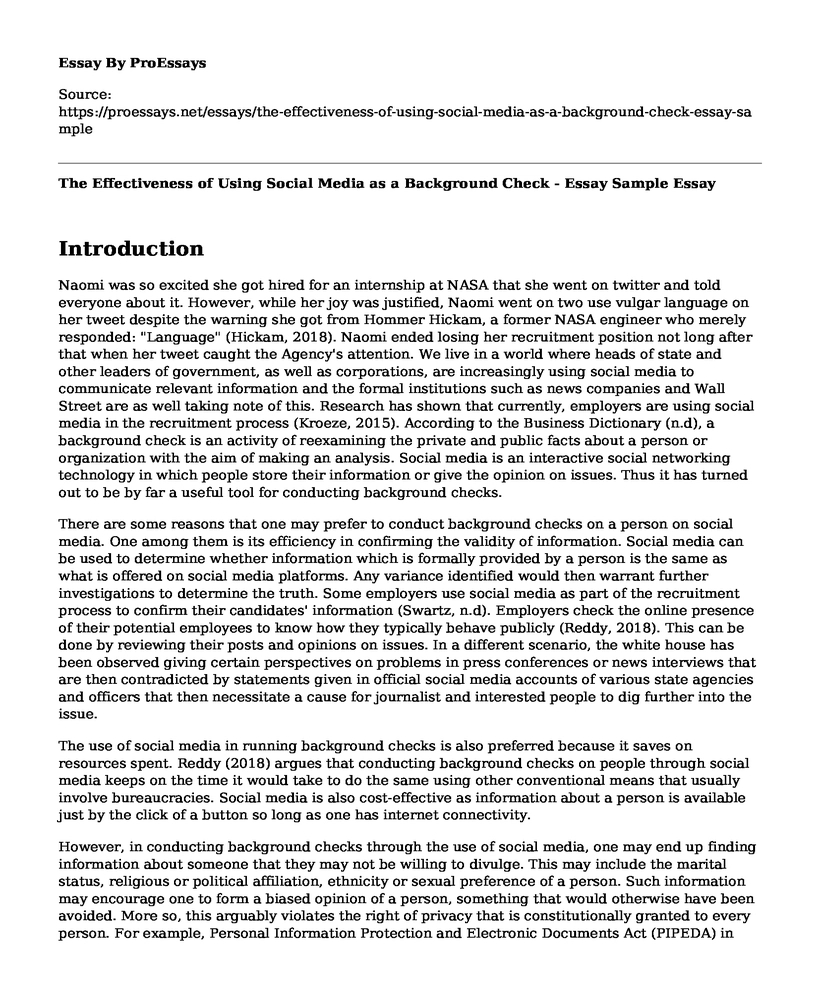Introduction
Naomi was so excited she got hired for an internship at NASA that she went on twitter and told everyone about it. However, while her joy was justified, Naomi went on two use vulgar language on her tweet despite the warning she got from Hommer Hickam, a former NASA engineer who merely responded: "Language" (Hickam, 2018). Naomi ended losing her recruitment position not long after that when her tweet caught the Agency's attention. We live in a world where heads of state and other leaders of government, as well as corporations, are increasingly using social media to communicate relevant information and the formal institutions such as news companies and Wall Street are as well taking note of this. Research has shown that currently, employers are using social media in the recruitment process (Kroeze, 2015). According to the Business Dictionary (n.d), a background check is an activity of reexamining the private and public facts about a person or organization with the aim of making an analysis. Social media is an interactive social networking technology in which people store their information or give the opinion on issues. Thus it has turned out to be by far a useful tool for conducting background checks.
There are some reasons that one may prefer to conduct background checks on a person on social media. One among them is its efficiency in confirming the validity of information. Social media can be used to determine whether information which is formally provided by a person is the same as what is offered on social media platforms. Any variance identified would then warrant further investigations to determine the truth. Some employers use social media as part of the recruitment process to confirm their candidates' information (Swartz, n.d). Employers check the online presence of their potential employees to know how they typically behave publicly (Reddy, 2018). This can be done by reviewing their posts and opinions on issues. In a different scenario, the white house has been observed giving certain perspectives on problems in press conferences or news interviews that are then contradicted by statements given in official social media accounts of various state agencies and officers that then necessitate a cause for journalist and interested people to dig further into the issue.
The use of social media in running background checks is also preferred because it saves on resources spent. Reddy (2018) argues that conducting background checks on people through social media keeps on the time it would take to do the same using other conventional means that usually involve bureaucracies. Social media is also cost-effective as information about a person is available just by the click of a button so long as one has internet connectivity.
However, in conducting background checks through the use of social media, one may end up finding information about someone that they may not be willing to divulge. This may include the marital status, religious or political affiliation, ethnicity or sexual preference of a person. Such information may encourage one to form a biased opinion of a person, something that would otherwise have been avoided. More so, this arguably violates the right of privacy that is constitutionally granted to every person. For example, Personal Information Protection and Electronic Documents Act (PIPEDA) in Canada restrains any employer that is regulated by the federal government against the use or collection of the personal information of his/her employee or a potential one without their permission or knowledge (PIPEDA, n.d). The UK has a Data Protection Act that regulated the holding or processing of an individual's personal information by companies( Kroeze, 2015). The legality of using social media for background checks, therefore, raises eyebrows.
Conclusion
All in all, although the use of social media to gather background information of a person or entity goings against specific human rights restrictions under the law, it is still, by far, a very effective way of gathering background information.
References
Business Dictionary. (n.d). Background check. Web Finance Inc. Retrieved from: http://www.businessdictionary.com/definition/background-check.html
Hickam, Homer (Homer Hickam). "Language." August 2018,01:12 a.m. Tweet.
Kroeze, R. (2015). Recruitment via Social Media Sites: A Critical Review and Research Agenda. Enschede, The Netherlands. Retrieved from: https://essay.utwente.nl/68499/1/Kroeze_BA_BMS.pdf
PIPEDA. (n.d). Personal Information Protection and Electronic Documents Act. Office of the Privacy Commissioner of Canada.Retrievd from: https://www.priv.gc.ca/en/privacy-topics/privacy-laws-in-canada/the-personal-information-protection-and-electronic-documents-act-pipeda/#wb-cont
Swartz, M. (n.d). Social Media and Background Checks. Monstor. Retrieved from:https://hiring.monster.ca/hr/hr-best-practices/recruiting-hiring-advice/screening-job-candidates/social-media-background-checks.aspx
Cite this page
The Effectiveness of Using Social Media as a Background Check - Essay Sample. (2022, Dec 14). Retrieved from https://proessays.net/essays/the-effectiveness-of-using-social-media-as-a-background-check-essay-sample
If you are the original author of this essay and no longer wish to have it published on the ProEssays website, please click below to request its removal:
- Speech Given by a Presidential Candidate
- Media Violence Impact on Real Life
- Social Media Sites Which Are Frequently Used to Find Partners
- Paper Example on Minors and Social Networks
- Language Is More Important for the Postmodernist and Postcolonial Writers Than for the Modernists
- The Significance of the Completion of the Baptistery Doors of the Cathedral of Florence
- Initial Public Offering Value of Facebook Supply Paper Example







